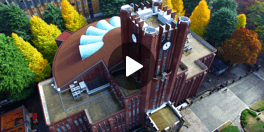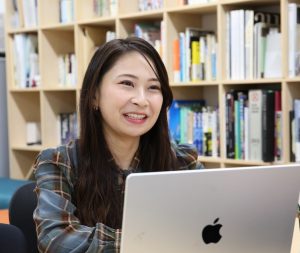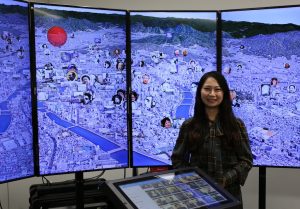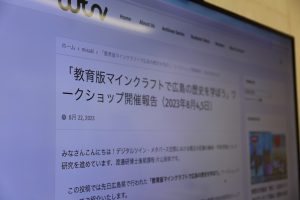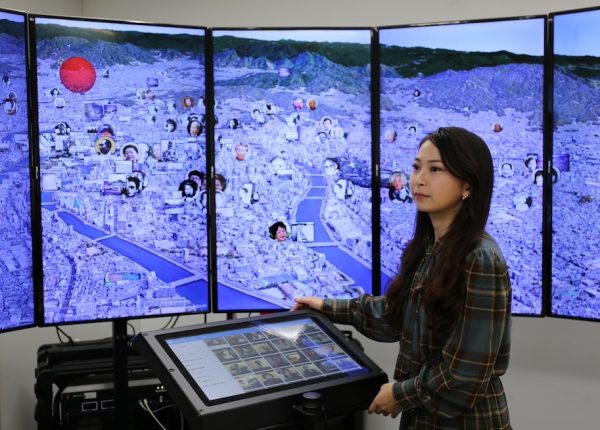
February 22, 2024
デジタルテクノロジーを活用した平和学習の開発 – 国連軍縮部「ユース非核リーダー基金」に参加する片山実咲さんインタビューDisarmament, Peace Education and Digital Technology: An Interview with Misaki Katayama
博士課程1年の片山実咲さん(文化人間情報学コース・渡邉英徳研究室)は、国連軍縮部(UNODA)が核廃絶に向けた未来のリーダーを育成するために2023年に設立した“Youth Leader Fund for a World without Nuclear Weapons”(ユース非核リーダー基金)の第1期生として、世界中から応募した2000名の中から100人のひとりに選ばれました。これは2022年の第10回核兵器不拡散条約(NPT)運用検討会議において岸田文雄首相が「ヒロシマ・アクション・プラン」の一環として日本政府が拠出を表明し、UNODAの運営のもと展開されています。2年間のプログラムは1月に始まったところで、片山さんは現在オンラインで核軍縮、不拡散及び軍備管理などに関する研修を受けています。
広島出身の片山さんは被爆3世でもあり、高校時代から地元で国連に核兵器の廃絶を求める署名活動や、被爆体験の語り部の活動をサポートしてきました。「語り部の人たちにとって(被爆経験を語ることは)半世紀以上かけてようやくできたかさぶたを自らひき剥がすような感覚だと聞いています。それでも話そうとする人たちの思いは大切にしないといけない」と話す片山さんは、学部時代から語り部の方々や被爆の記憶の継承について研究してきました。
「原爆などの負の記憶を、世代を超えて継承するには教育が鍵を握る」という片山さんは、被爆体験者が他界し減少していくことへの危機感と、被爆証言の伝達手段のデジタル化が急速に進む状況を見ながら、「デジタル上で原爆の記憶の継承は本当にできるのだろうか」という疑問が湧いたそうです。修士課程まで在籍した教育学研究科では、教育心理学の視点から、原爆に関する学習のメディアの変化が「平和」という概念の形成にどう影響するかについての教育効果の比較研究を行い、デジタルアーカイブコンテンツの教育利用の課題を見出しました。
博士課程より在籍する学府では「デジタルテクノロジーを活用した原爆の記憶の継承や平和学習の開発」を研究テーマとする片山さん。「核兵器が使われてしまうとどのような被害が起こるのかを、破壊された街にいた人たちの視点で学んでほしい」という思いで、デジタル技術の平和教育への活用のあり方を研究中です。昨夏にはそのひとつの実践として「教育版マインクラフトで広島の歴史を学ぼう」ワークショップを開催しました。
UNODAのプログラムへの参加は、片山さんにとっては国連の考える平和学習の視点や、軍縮に関する知見を体系的に学べる機会となっているとのこと。また、これまでは日本での継承実践について研究を行っていましたが、海外に視野を広げる必要性を認識したそうです。今後はプログラムの参加者どうしのディスカッションや、選抜されたメンバーによる広島及び長崎へのスタディツアーが予定されており、ご自身の研究を紹介してみたいと意欲的に語られました。実は社会人学生でもある片山さんですが、ゆるぎない使命感とともに、しなやかに研究に取り組む姿がとても印象的でした。
テキスト:神谷説子(特任助教・編集部)
写真:柳志旼(博士課程・編集部)
Misaki Katayama, a first-year Ph.D. student in the Cultural and Human Informatics Course and a member of Hidenori Watanave Laboratory, has been chosen as a participant in the “Youth Fund for a World Without Nuclear Weapons,” established by the United Nations Office for Disarmament (UNODA) in 2023 to cultivate future leaders committed to the abolition of nuclear weapons. Katayama was chosen as one of the 100 participants from more than 2,000 applicants worldwide. The two-year program was initiated as part of the “Hiroshima Action Plan” announced by Prime Minister Fumio Kishida at the 10th Review Conference of the Treaty on the Non-Proliferation of Nuclear Weapons (NPT) in 2022. Currently, Katayama is participating in the program’s online learning curriculum on nuclear disarmament, non-proliferation, and arms control, which she says allows her to systematically learn about the UN’s perspective on peace learning and disarmament.
A native of Hiroshima Prefecture and a member of the third generation of atomic bomb survivors, Katayama has been active in promoting the abolition of nuclear weapons since her high school days and has supported the activities of local A-bomb storytellers. While closely working with the storytellers, Katayama said she recognized the enormous pain the survivors deal with when recalling their lives and talking about them. “Despite the pain, they were determined to tell their stories because they were committed to preventing the repetition of similar experiences,” she said. “I’ve always felt the need to preserve that and hand it down to the next generation.”
Katayama believes education is a crucial tool for passing on such individual memories and transmitting information across generations. Over the years, however, Katayama’s concern about the dwindling number of atomic bomb survivors and the rapid increase in the efforts to digitize their testimonies led her to explore the intersection of digital technology and peace education. Her previous research during her master’s program at the Graduate School of Education focused on how learning about the atomic bomb through directly hearing from the survivors and indirectly learning from digital archives impact the formation of the concept of “peace” from an educational psychology perspective. Currently, at the GSII, Katayama’s doctoral research is on the topic of developing ways to hand down personal memories of the Hiroshima Atomic Bomb survivors and peace-learning materials through the use of digital technology. She wants people to recognize the consequences that nuclear weapons bring from the viewpoints of the victims who lived in the city that was destroyed.
Looking ahead, Katayama is looking forward to engaging in discussions with the UNODA program participants and participating in a study tour to Hiroshima which only selected members from the program can attend, and hopefully introducing her research project to her peers. Despite her busy schedule as a working student at an IT firm, Katayama approaches her research with dedication and an unwavering sense of mission to contribute to the field of peace education and disarmament.
Text: Setsuko Kamiya (Project Assistant Professor)
English proofreading: David Buist (Project Senior Specialist)

